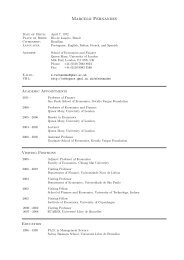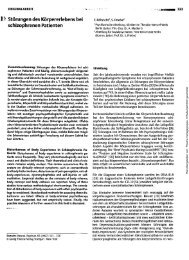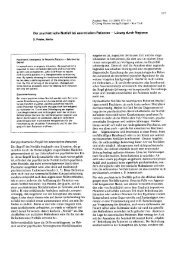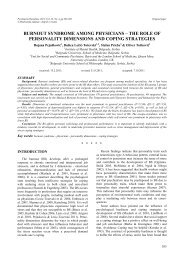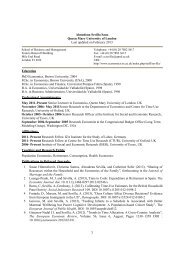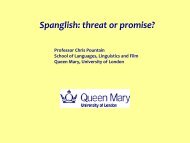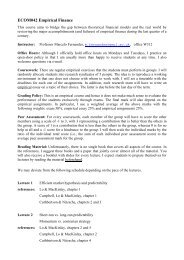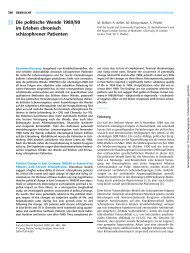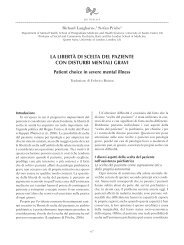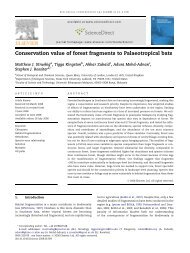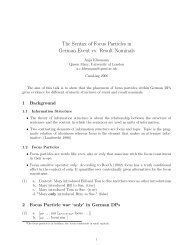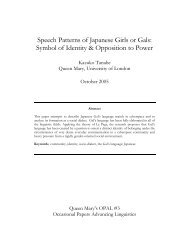Proofs - Personal Webspace for QMUL - Queen Mary, University of ...
Proofs - Personal Webspace for QMUL - Queen Mary, University of ...
Proofs - Personal Webspace for QMUL - Queen Mary, University of ...
Create successful ePaper yourself
Turn your PDF publications into a flip-book with our unique Google optimized e-Paper software.
2. Psychosocial care as a necessary foundation<br />
<strong>for</strong> psychiatric medical care<br />
The very low number <strong>of</strong> doctors focusing on mental health<br />
care in Kabul (about 30 medical doctors mainly trained in internal<br />
medicine with varying degrees <strong>of</strong> exposure to psychiatric<br />
patients) compared to the number <strong>of</strong> inhabitants <strong>of</strong> Kabul (about<br />
5 million) shows that even with the highest ef<strong>for</strong>ts, training <strong>of</strong><br />
medical specialists <strong>for</strong> mental health care cannot match the<br />
need <strong>for</strong> psychosocial care in a highly traumatized and large<br />
population. There<strong>for</strong>e, medical care should only be secondary to<br />
primary psychosocial interventions addressing domestic, family<br />
and social confl icts that <strong>of</strong>ten result from traumatization and<br />
suffering from mental disorders.<br />
Within a so called Basic Package <strong>of</strong> Health Care Services,<br />
the Afghan government supports the establishment <strong>of</strong> positions<br />
<strong>for</strong> psychosocial counsellors (PSCs) in comprehensive<br />
health care centers (CHCs), which care <strong>for</strong> a population about<br />
100 000 inhabitants [11]. The PSC trainees are selected according<br />
to selection criteria set by the Mental Health Department <strong>of</strong> the<br />
Ministry <strong>of</strong> Public Health, e.g. preferably a medical background<br />
(medical doctors, nurses, midwifes), or a degree in social sciences<br />
or social work, over 25 years <strong>of</strong> age, not overburdened by own<br />
psychological problems, and with high motivation, i.e. interest<br />
<strong>for</strong> a deeper understanding <strong>of</strong> social relations within defi ned<br />
cultural contexts. After the selection process, they enter one year<br />
training. After the fi rst three months intensive training, they take<br />
their fi rst examination and after 9 months practical work under<br />
supervision their second examination. Only then can they work<br />
as PSCs in the Comprehensive Health Care Centers.<br />
Counsellors can address family confl icts and violence e.g.<br />
resulting from drug (particularly opiate) abuse and from affective<br />
disorders in traumatized family members [15]. Psychosocial<br />
counselling can help to strengthen women’s rights by increasing<br />
contact between the women’s original family and the extended<br />
family into which a woman married, and by identifying family<br />
members that can help mediate confl icts and protect women<br />
and children. Psychosocial counselling can also help to deal<br />
with milder <strong>for</strong>ms <strong>of</strong> depression and traumatization that do<br />
not require medication. Furthermore, a well- established network<br />
<strong>of</strong> psychosocial counsellors can help to distinguish between<br />
patients with major psychiatric disorders such as schizophrenia,<br />
who can live within a family and are treated rather well, and<br />
those who urgently need more specialized medical care in order<br />
to facilitate their life within a family context. Given the average<br />
prevalence <strong>of</strong> schizophrenia is at least one percent <strong>of</strong> the<br />
population [8], in a city like Kabul, at least 50.000 subjects will<br />
suffer from schizophrenia, clearly indicating that any outpatient<br />
hospitalized care delivered by medical departments and clinics is<br />
currently illusionary. There<strong>for</strong>e, medical facilities have to focus<br />
on those few subjects who, due to the severity <strong>of</strong> their symptoms,<br />
can currently not be integrated and supported by their families.<br />
There<strong>for</strong>e, medical staff in health posts, district and regional<br />
hospitals needs basic knowledge in order to transfer those few<br />
patients who need more intensive therapy towards specialized<br />
psychiatric units and to help stabilize the vast majority <strong>of</strong> psychiatric<br />
patients with the help <strong>of</strong> psychosocial counsellors and<br />
some basic medication skills. Foreseen were two psychosocial<br />
counsellors (PSCs) in each Comprehensive Health Care Center<br />
I. Missmahl et al. / European Psychiatry 27 (2012) / supplement n°2 / S76-S80 S77<br />
(CHC), one female and one male. At the time being, the Basic<br />
Package <strong>of</strong> Health Care Services <strong>for</strong>esees only one, which would<br />
mean that half <strong>of</strong> the population would be excluded, since men<br />
cannot treat women and vice versa. This is supported by the<br />
European Union and USAID. Offi cially only one counsellor per<br />
CHC is found in Basic Package <strong>of</strong> Health Care Services guidelines.<br />
The Ministry oad Public Health is aware <strong>of</strong> this unbalanced situation<br />
and currently plans to amend it.<br />
3. Training <strong>of</strong> psychosocial counsellors<br />
Besides basic knowledge in the classifi cation <strong>of</strong> mental<br />
disorders (which is required e.g. to decide when referral is necessary),<br />
it is <strong>of</strong> main importance <strong>for</strong> psychosocial counsellors to be<br />
able to understand and interpret social confl icts from different<br />
perspectives and the meaning <strong>of</strong> the symptom in the given<br />
cultural context. The key to successful treatment is to help the<br />
patient feel again that she/he can actively infl uence their lives<br />
again. Furthermore, counsellors need to have the skills to explore<br />
together with the client solutions based on the patient’s values<br />
and his resources, and they need to refrain from giving advice.<br />
For example, without proper training, one drug counsellor<br />
was rather proud <strong>of</strong> convincing a drug addicted woman to<br />
marry the man that her family had selected <strong>for</strong> her, feeling that<br />
this helps social integration <strong>of</strong> her client. However, she did not<br />
consider the case from the perspective <strong>of</strong> the individual, neither<br />
did she compare family values with overall traditional values<br />
or with perspective <strong>of</strong> “true love” as experienced by the client.<br />
Well trained counsellors, on the other hand, are able to<br />
consider the values and intervene in a culturally appropriate<br />
way. For instance, a desperate father felt <strong>for</strong>ced by traditional<br />
values to kill his daughter because she was raped by a family<br />
member. The empathetic counsellor helped the father to accept<br />
and reconnect with his feelings <strong>of</strong> love <strong>for</strong> his daughter. The<br />
client was thus able to take a stand to defend his daughter and<br />
to develop a confl ict resolution strategy within the family.<br />
In order to avoid that psychosocial counsellors just intervene<br />
on the side <strong>of</strong> tradition without discussing different perspectives<br />
and behavioural and social options with the client, counsellors<br />
have to experience themselves how social interactions can be<br />
interpreted within diverse contexts and to understand their own<br />
biases and prejudices. There<strong>for</strong>e the training plan <strong>for</strong>esees that<br />
all training contents are fi rst refl ected through self experience<br />
- no “cold knowledge”. During the fi rst three months <strong>of</strong> intensive<br />
training, all afternoons are fi lled with self experience in different<br />
groups, supported by single talks. In the mornings, case- centered<br />
intervention skills are taught. There are now well- trained Afghan<br />
counsellors in place; the team <strong>of</strong> the core trainers is working<br />
together since 2004. The fi rst curriculum has been developed<br />
by Inge Missmahl based on experiences within a pilot phase.<br />
This fi rst curriculum was taught to 30 Afghan men and women,<br />
who then worked in 15 centers in Kabul from 2005- 2008, where<br />
they treated more than 11.000 patients, 70% with good results<br />
according to symptom- based pre- post evaluations. After this<br />
phase, the training was evaluated and improved and the second<br />
training period started in 2008. The trained counsellors then<br />
worked in 9 CHCs in Herat, Mazar- e- Sharif and Bamyan. After the<br />
second evaluation <strong>of</strong> the training’s content and methodology [4],<br />
<strong>Pro<strong>of</strong>s</strong><br />
13_Heinz.indd S77 14/06/2012 14:45:44



